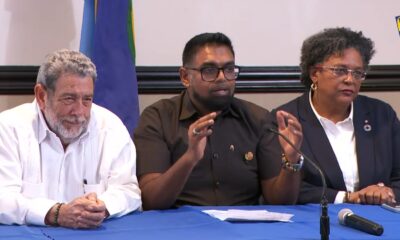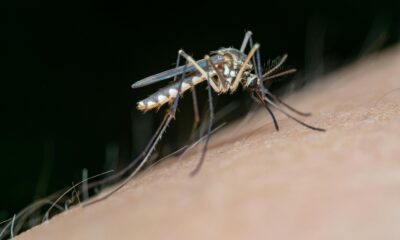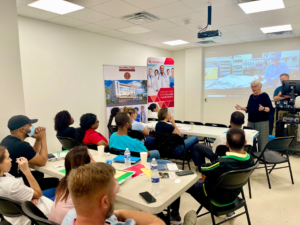#TurksandCaicos, August 20, 2021 –
We should Be Concerned about the Delta Variant
After a year and a half, we are still in the pandemic. It is the survival of the fittest between humans and the coronavirus Variants. We are racing to herd immunity, to get more people vaccinated and to get more effective antiviral medications.
We are seeing people dismiss COVID as a just another common cold, and even worse not wearing masks in public places or social distancing. We are also seeing a lack of compliance to the established COVID-19 protocols. We are seeing most safety protocols being abandoned and persons going back to business as usual pre-COVID. We are seeing persons, some who are vaccinated, travelling to cities with high rates of new COVID-19 cases and returning back home to the Turks and Caicos Islands without knowing their COVID status.
With new cases now emerging daily in the TCI the situation could deteriorate very rapidly. We should not allow the flood gates to be wide open. We as a country cannot ease up our efforts at this time, and should not stop fighting until the virus has been defeated. We have to do whatever it takes to battle this unseen enemy.
Therefore, we should be very concerned about the newer, faster transmitting, Delta Variant (B16172). This Variant seems to be the prevalent strain circulating in the TCI at the moment, and has been seen to be two times more infectious than the original G-Variant. Recent reports from the UK indicate that the Delta Variant is infecting younger people more than the original variant, and that the symptoms are different.
With the original variant infected persons would present with symptoms of high fever, muscle pains, cough, severe chest pain etc., but with the Delta Variant, many infected persons are presenting with symptoms of stuffy or running nose, sneezing, sore throat, and mild headaches. Younger people usually show little or no symptoms, and are less likely to get tested, hence not knowing their COVID status and possible spreading the virus more.
Additionally, scientific data sources are now showing that vaccinated persons with a good immune system may also become infected and show little or mild symptoms, and not get tested, and possibly spread the virus to susceptible individuals. 
Viruses have one goal, that is to make more copies of themselves (to multiply), and since they can’t do it on their own, they use us (a host). They infect our body cells and use them to make copies of themselves. They replicate themselves many times, making millions of copies of themselves, but eventually it makes a mistake. The mistake is referred to as a mutation, and it changes the instructions for making the virus. That slightly altered virus is a Variant. Mutations in viruses happen all the time, producing new variants. Most of the time these mutations are insignificant or make the virus weaker, and they naturally disappear. But sometimes a series of mutations makes the virus stronger, and gives it an edge over its host. These advantages include giving the viruses the ability to bind to the human cells better, and the ability to enter the cells easier, making the virus more transmissible, allowing it to become the dominant strain in many places around the world.
It is important to remember that mutations are random errors, but the longer a virus is around, and the more people it infects, the more it will change, and the more those changes accumulate, the more chance the virus has to evolve into a more dangerous variant.
The Delta Variant which is the most recent addition to this list of dangerous Variants, is described as a “Double Mutant”, whose mutations seems to make it more transmissible, as it binds to the cell receptors better than other variants, thus blocking those other variants from binding. Its mutations also made it more easy to infect people who have had COVID-19. This means this Variant has a greater change to evade our body’s natural immune response.
Scientific Data has shown that the immune response we get from vaccines are stronger than what we get from a natural response to the virus. Therefore, we would see some persons who previously contracted COVID-19 becoming re-infected, and there would be persons who have taken the vaccine becoming infected with COVID-19 (breakthrough cases). But the difference being seen is that the effect on vaccinated individuals is less severe with possibly no symptoms and are less likely to be admitted to the hospital.
The virus has evolved, and will continue to produce variants, some which may give it an advantage. So if we want to prevent the possibility of a deadlier, and more transmissible strain from developing, we need to stop the Virus.
The Pandemic is not over, even if it feels that way to some of us. The virus has mutated to become more transmissible. Now is not the time for the Turks and Caicos, nor the rest of the world to let its guard down.
The Delta Variant is now presenting as the prevalent variant in a number of countries, and certainly it is now present in the Turks & Caicos. The more we test the more we pick up on silent cases in our communities.
We are now better equipped to respond to the pandemic, and our ability to test is now so much better. Our hospital capacity is now much better to deal with COVID patients, including the availability of oxygen generation.
The New PNP Government must now do its part and insure that our Health Care System stays adequately staffed with the necessary health professionals to care for our hospitalized individuals, and that the right complement of health workers is employed to respond to Outbreaks and Pandemics, that is, having trained staff to perform Surveillance and Monitoring activities, Compliance activities, Testing and research, quarantining, vaccinating, community work, and School Health.
Additionally, the new PNP Government needs to make the tough, and sometimes unpopular decision to ensure that the right policies and guidelines are put in place for the mitigation of further spread of Variants, and for protecting our country and our people.
We should never just focus on what we are seeing today, but must always try to keep a few steps ahead of the virus, by looking at what future advances and abilities are needed. The Government should be looking at what are the technologies and enhancements we could make based on the lessons we have learned, and making the containment, monitoring, and reduction in spread of COVID Variant, and other new viruses much better the next time around.
Hon. Edwin A. Astwood
Leader of the Opposition


 Caribbean News1 week ago
Caribbean News1 week ago
 Caribbean News1 week ago
Caribbean News1 week ago
 Health1 week ago
Health1 week ago
 Health1 week ago
Health1 week ago
 Caribbean News5 days ago
Caribbean News5 days ago
 Health1 week ago
Health1 week ago
 Caribbean News5 days ago
Caribbean News5 days ago
 Caribbean News2 days ago
Caribbean News2 days ago






















